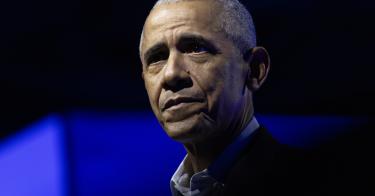Former President Barack Obama refuses to go away. Unlike most of his predecessors, he has taken up residence in Washington and clings to power the way he once mocked Americans for clinging to their guns and Bibles.
And he really clings to the cultural Marxist conflict theory that relies on race and sex, and not class.
This matters. Obama now leads the opposition. President Joe Biden and Vice President Kamala Harris may retain ostensible titles, but they’re gone—from the public imagination and the nightly news.
And Obama matters because he changed our politics. His two terms coincided with a sharp new focus on racial conflicts, but not with racial healing. On the contrary.
Obama, in fact, was elected at a time when large majorities thought that race relations were good or very good—more than 70% of whites and 61% of blacks said as much—but by the time he left office, those numbers had plunged to under 50% for whites and under 40% for blacks.
>>> Freeing People From the Left Starts With the U.S. Census
He thus introduced a level of racial discord that perhaps can be better understood in retrospect, and cannot be blamed on external factors. He did, for example, campaign explicitly on a racial basis, as when he said Hispanics should tell themselves, “We’re gonna punish our enemies, and we’re gonna reward our friends.”
Ironically, it may take President-elect Donald Trump, whom critics wantonly denounced as “racist” and “xenophobic,” to start putting the era of racial angst behind us. He was elected by a truly multi-racial coalition—Hispanics ended up voting for him in unprecedented numbers—that responded to class-based concerns (bicoastal elites against the “great unwashed” that Biden termed “garbage”), putting race in the rearview mirror.
But Obama remains in place precisely to thwart Trump. He backed Kamala Harris to the hilt, embarking on a campaign blitz that took him through battleground states from Oct. 10 to just before the election. And yet he came up a cropper, so now he’s trying to organize a resistance.
The 44th president’s latest foray into the limelight, or at least attention grabbing, came earlier this month during his speech at his Obama Foundation’s so-called “Democracy Forum,” an event he has held the past three years.
The speech was vintage Obama in every conceivable way. He applied his usual oratorical jiu-jitsu—on the surface appearing to try to build bridges and appeal to our better angels, while underneath sowing division and distrust.
More importantly, the speech made clear that Obama is not just clinging on to power—he’s also clinging on to the idea that race is still the key matter in politics, and generally in society.
Vintage Obama, for example, was to start by attributing to “friends” something he clearly thinks himself. “As far as they were concerned,” he said of these unnamed “friends,” “the election proved that democracy is pretty far down on people’s priority list. I understood their skepticism; maybe you have had a conversation with a friend that felt the same way.”
I haven’t personally, no. But go over to BlueSky (which wags are already dubbing “BlueCry”) and the “Trump got elected because people don’t care about democracy” meme is de rigueur, no matter how mutually exclusive those two messages are.
As he does on occasion, Obama let the mask slip. “At this moment in history,” he said, making clear that he shares his “friends’” conflation of their preferred policy options with democracy, “when core democratic principles seem to be continuously under attack … now is precisely the time to ask ourselves tough questions about how we can build our democracies.”
Obama then went on to blame the end of comity in race relations not on himself, but on the rise of “historically marginalized groups” making demands following the Civil Rights movement of the 1960s.
“Blacks, Latinos, Asians, Native Americans; women and gays and lesbians; and disabled Americans—demanded a seat at the table,” he said. The problem was that “not only did they insist on a fair share of government-directed resources, but they brought with them new issues, born of their unique experiences that could not just be resolved by just giving them a bigger slice of the pie.”
Yes, you heard that right—ensuring that all Americans received fair shares of resources was not sufficient. “Racial minorities insisted that the government intervene more deeply in the private sector and civil society to root out long-standing, systemic discrimination,” he added.
>>> Why Are Educators Fomenting Racial Resentment?
“In other words, politics wasn’t just a fight about tax rates or roads anymore. It was about more fundamental issues that went to the core of our being and how we expected society to structure itself. Issues of identity and status and gender,” Obama said.
So public arguments “became louder, more contentious, and more emotional,” and this made “a lot of people”—members of the dominant groups, to be sure, but also those benighted members of the subordinate ones “who’d been raised to put their faith in authority and tradition”—start “to feel that their way of life, the American way of life, was under attack.”
Obama, you see, doesn’t like the current Trump-inspired return-to-class analysis. His preferred Marxist conflict theory centers on racial, sexual, and other immutable identities.
He thus railed against those who put down identity politics as “just folks trying to find an excuse to be able to continue to do what they’ve been doing, in terms of feeling free to call people names or diminish them in some fashion.”
It isn’t clear that Obama can put the identity band together again, of course. The strategy he offered seemed to be more neighborhood organizing, and more shameless projection (for example, attributing lawfare and “politicizing the armed forces,” things progressives have mastered, to his political enemies), but America seems to have grown tired of the use of race to grab power.
Hopefully, it will also soon grow tired of Obama.
This piece originally appeared in Restoring America by the Washington Examiner




